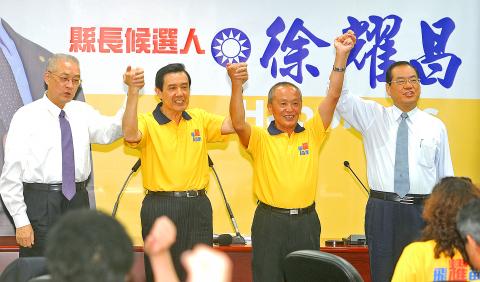Chinese Nationalist Party (KMT) spokesperson Charles Chen (陳以信) yesterday criticized the Chinese-language Next Magazine for its article suggesting that President Ma Ying-jeou (馬英九) has illegally received donations from Ting Hsin International Group (頂新國際集團), owned by the Wei family involved in repeated tainted cooking oil scandals.
The article described Ma, who doubles as chairman of the KMT, as persisting in going his own way, despite strenuous objections from within the KMT, as shown in the party’s recent decision to appeal the Taiwan High Court’s ruling on the party’s revocation of Legislative Speaker Wang Jin-pyng’s (王金平) membership for allegedly trying to influence a judicial case.
Chen said Next Magazine failed to abide by ethical standards of journalism by alleging irregularities involving the head of state and defamed Ma.

Photo: Fang Pin-chao, Taipei Times
The KMT has repeatedly stated that the party did not receive any political contributions from Ting Hsin between 2008 and last year, Chen said, adding that Ma did not receive any donations from the group during his re-election campaign in the 2012 presidential election.
In a statement issued late on Tuesday night, Ma, in his capacity as KMT chairman, rejected the allegation made by Wu Tsu-chia (吳子嘉), a political commentator, that he had received NT$1 billion (US$32.9 million) from Ting Hsin as “groundless,” demanding that Wu issue a public apology before today or face a lawsuit.
The allegation that Ma had assisted the Wei family in growing their businesses in return for political donations has disturbed society, the statement said.
Ma said that he would consider legal action against anyone who continues to make similar insinuations in the media to protect his reputation and that of the party.

The US government has signed defense cooperation agreements with Japan and the Philippines to boost the deterrence capabilities of countries in the first island chain, a report by the National Security Bureau (NSB) showed. The main countries on the first island chain include the two nations and Taiwan. The bureau is to present the report at a meeting of the legislature’s Foreign Affairs and National Defense Committee tomorrow. The US military has deployed Typhon missile systems to Japan’s Yamaguchi Prefecture and Zambales province in the Philippines during their joint military exercises. It has also installed NMESIS anti-ship systems in Japan’s Okinawa

TRAGEDY STRIKES TAIPEI: The suspect died after falling off a building after he threw smoke grenades into Taipei Main Station and went on a killing spree in Zhongshan A 27-year-old suspect allegedly threw smoke grenades in Taipei Main Station and then proceeded to Zhongshan MRT Station in a random killing spree that resulted in the death of the suspect and two other civilians, and seven injured, including one in critical condition, as of press time last night. The suspect, identified as a man surnamed Chang Wen (張文), allegedly began the attack at Taipei Main Station, the Taipei Fire Department said, adding that it received a report at 5:24pm that smoke grenades had been thrown in the station. One man in his 50s was rushed to hospital after a cardiac arrest

PUBLIC SAFETY: The premier said that security would be tightened in transport hubs, while President Lai commended the public for their bravery The government is to deploy more police, including rapid response units, in crowded public areas to ensure a swift response to any threats, President William Lai (賴清德) said yesterday after a knife attack killed three people and injured 11 in Taipei the previous day. Lai made the remarks following a briefing by the National Police Agency on the progress of the investigation, saying that the attack underscored the importance of cooperation in public security between the central and local governments. The attack unfolded in the early evening on Friday around Taipei Main Station’s M7 exit and later near the Taipei MRT’s Zhongshan

ON ALERT: Taiwan’s partners would issue warnings if China attempted to use Interpol to target Taiwanese, and the global body has mechanisms to prevent it, an official said China has stationed two to four people specializing in Taiwan affairs at its embassies in several democratic countries to monitor and harass Taiwanese, actions that the host nations would not tolerate, National Security Bureau (NSB) Director-General Tsai Ming-yen (蔡明彥) said yesterday. Tsai made the comments at a meeting of the legislature’s Foreign Affairs and National Defense Committee, which asked him and Minister of National Defense Wellington Koo (顧立雄) to report on potential conflicts in the Taiwan Strait and military preparedness. Democratic Progressive Party (DPP) Legislator Michelle Lin (林楚茵) expressed concern that Beijing has posted personnel from China’s Taiwan Affairs Office to its